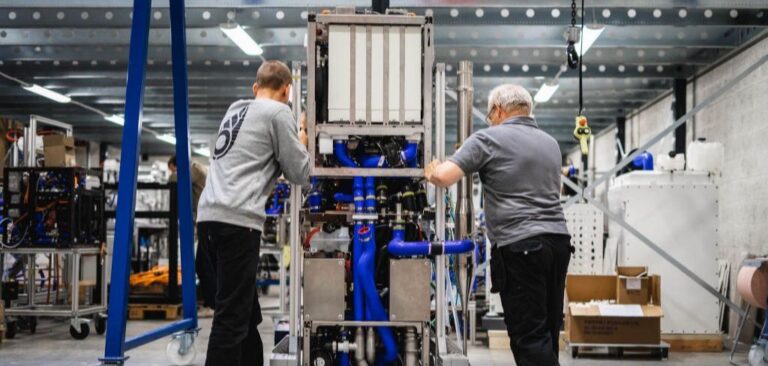A string test has been carried out by the PowerCell Group and e1 Marine in partnership with RIX Industries to test their technologies for a 200kW propulsion chain as part of the validation process for Maritime Partners’ M/V Hydrogen One inland push-boat. The 200kW chain can be multiplied and scaled to suit varying user requirements – up to a megawatt level – and is suitable for use by tugboats, push-boats and superyachts.
The test – carried out on land at the PowerCell Group’s headquarters in Gothenburg, Sweden – was labelled a success by the companies and is said to prove the viability of a concept which converts methanol fuel to hydrogen on board ships, before using the hydrogen in a fuel cell to generate power in a clean and efficient manner. The M/V Hydrogen One’s 1.4MW methanol-to-hydrogen system is used as the sole power generation source for its propulsion chain.
The concept enables new opportunities for hydrogen-powered vessels as the fuel is stored as methanol – a method which is less complex than using hydrogen. The conversion technology is then used to transform the methanol into fuel cell-ready hydrogen. An additional advantage of using a methanol hydrogen generator is the output of low-pressure hydrogen on demand, enabling safe installation and an integrated solution which does not impact vessel design.
“The successful completion of these tests gives future shipowners, integrators and methanol suppliers the confidence they need in this powerful combination of technologies,” said Richard Berkling, CEO, PowerCell Group.
“Fuel cells are some of the most efficient ways to extract energy from fuel, and we are deploying them at a scale never seen before. This can be seen in our project with Torghatten Nord, where we will supply 12.8MW fuel cells on Norway’s longest ferry route – the largest maritime project to date. This string test demonstrates that whatever the fuel, the new generation of fuel cells is ready to use it.”
Robert Schluter, managing director, e1 Marine, said, “This rigorous test has delivered exciting results thanks to a great deal of collaboration between equipment suppliers, and the results should be a cause for optimism across the industry. This test demonstrates that a methanol-to-hydrogen power chain is ready and waiting to deliver renewable power to a range of maritime applications.”



